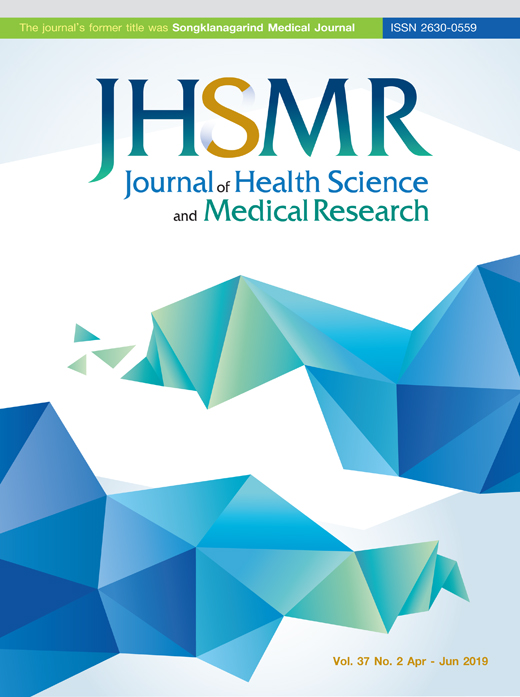Regulation and Decriminalisation of Illegal Substances in Thailand
DOI:
https://doi.org/10.31584/jhsmr.201943Keywords:
decriminalisation, drugs, policy, regulation, ThailandAbstract
Psychoactive substances – chemical compounds which can alter a person’s mood, thoughts, and behaviors may be liable to misuse and cause addiction. Internationally, many strategies have been implemented in order to limit the supply and demand of illegal substances, with a wide variation at the country level. Thailand is an upper-middle income country in Southeast Asia. Since 2015, Thai authorities and policymakers have instituted many changes to the legal controls on illegal drugs. The aim of this review was to summarise the history of drug control and regulation in Thailand, focusing on opioids (including Kratom), methamphetamines and cannabis, and the outcome of recent strategies. Recent measures towards decriminalising substance use disorders are also discussed.
References
2. McMahon V. UNDCP facing the challenge. Vienna: UN International Drug Control Programme; 1997.
3. United Nations Office on Drugs and Crime. Making the world safer from crime, drugs and terrorism. Slovakia: UN; 2007.
4. Poomchuen W, Kannika N, Kalayasiri R. The changing view of the Thai society on substance situation. Songkhla: Thailand Substance Abuse Academic Network; 2016.
5. The Revenue Department of Thailand. Memento at the openning of the Revenue Department building on 2nd September 1997. Bangkok: The Department; 1997.
6. Office of the Narcotics Control Board. ONCB: Background. Bangkok: ONCB; 1976.
7. Crooker RA. Forces of change in the Thailand opium zone. Geographical Review 1988;78:241-56.
8. McKetin R, McKetin R, Kozel N, McKetin R, Kozel N, Douglas J, et al. The rise of methamphetamine in Southeast and East Asia. Drug Alcohol Rev 2008;27:220-8.
9. Farrell M, Marsden J, Ali R, Ling W. Methamphetamine: drug use and psychoses becomes a major public health issue in the Asia Pacific region. Addiction 2002;97:771-2.
10. The Administrative Committee of Substance Abuse Academic Network. Preliminary report of project estimation of population related with substance abuse: status of drug and substance use: 2001. Bangkok: ONCB; 2002.
11. Roberts M, Trace M, Klein A. Thailand’s ‘war on drugs’. Oxford: Beckley Foundation Drug Policy Programme; 2004.
12. Arunpongpaisal S, Intharakamhang D, Kalayasiri R. Detoxification. In: Kalayasiri R, Rungnirundorn T, editors. Recommendations for the management and treatment of substancerelated disorders. Bangkok: Chulalongkorn University; 2015;p.64.
13. Smith NT. A review of the published literature into cannabis withdrawal symptoms in human users. Addiction 2002;97:621-32.
14. Large M, Sharma S, Compton MT, Slade T, Nielssen O. Cannabis use and earlier onset of psychosis: a systematic metaanalysis. Arch Gen Psychiatry 2011;68:555-61.
15. Whiting PF, Wolff RF, Deshpande S, Di Nisio M, Duffy S, Hernandez AV, et al. Cannabinoids for medical use: a systematic review and meta-analysis. JAMA 2015;313:2456-73.
16. Solowij N, Stephens RS, Roffman RA, Babor T, Kadden R, Miller M, et al. Cognitive functioning of long-term heavy cannabis users seeking treatment. JAMA 2002;287:1123-31.
17. Global Commission on Drug Policy. Taking control: pathways to drug policies that work. Geneva: GCDC; 2014.
18. Tanguay P. Kratom in Thailand. London: International Drug Policy Consortium; 2011.
19. Chittrakarn S, Penjamras P, Keawpradub N. Quantitative analysis of mitragynine, codeine, caffeine, chlorpheniramine and phenylephrine in a kratom (Mitragyna speciosa Korth.) cocktail using high-performance liquid chromatography. Forensic Sci Int 2012;217:81-6.
20. Saingam D. Substance abuse policy in Thailand: current challenges and future strategies. Stanford: Asia Health Policy Program; 2018.
21. Trakulsrichai S, Tongpo A, Sriapha C, Wongvisawakorn S, Rittilert P, Kaojarern S, et al. Kratom abuse in Ramathibodi Poison Center, Thailand: a five-year experience. J Psychoactive Drugs 2013;45:404-8.
























